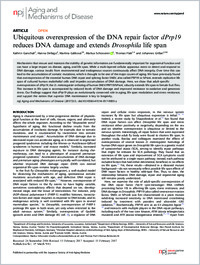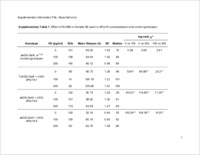Ubiquitous overexpression of the DNA repair factor dPrp19 reduces DNA damage and extends Drosophila life span
- Garschall, Kathrin Department of Ecology and Evolution, University of Lausanne, Switzerland
- Dellago, Hanna Department of Biotechnology, BOKU – University of Natural Resources and Life Sciences, Vienna, Austria
- Gáliková, Martina Institut für Populationsgenetik, Vetmeduni Vienna, Vienna, Austria
- Schosserer, Markus Department of Biotechnology, BOKU – University of Natural Resources and Life Sciences, Vienna, Austria
- Flatt, Thomas Department of Ecology and Evolution, University of Lausanne, Switzerland - Institut für Populationsgenetik, Vetmeduni Vienna, Vienna, Austria
- Grillari, Johannes Department of Biotechnology, BOKU – University of Natural Resources and Life Sciences, Vienna, Austria - Christian Doppler Laboratory on Biotechnology of Skin Aging, Dept. of Biotechnology, BOKU – University of Natural Resources and Life Sciences, Vienna, Austria - Evercyte GmbH, Vienna, Austria
-
15.03.2017
Published in:
- npj Aging and Mechanisms of Disease. - 2017, vol. 3, no. 1, p. 5
English
Mechanisms that ensure and maintain the stability of genetic information are fundamentally important for organismal function and can have a large impact on disease, aging, and life span. While a multi-layered cellular apparatus exists to detect and respond to DNA damage, various insults from environmental and endogenous sources continuously affect DNA integrity. Over time this can lead to the accumulation of somatic mutations, which is thought to be one of the major causes of aging. We have previously found that overexpression of the essential human DNA repair and splicing factor SNEV, also called PRP19 or hPso4, extends replicative life span of cultured human endothelial cells and impedes accumulation of DNA damage. Here, we show that adult-specific overexpression of dPrp19, the D. melanogaster ortholog of human SNEV/PRP19/hPso4, robustly extends life span in female fruit flies. This increase in life span is accompanied by reduced levels of DNA damage and improved resistance to oxidative and genotoxic stress. Our findings suggest that dPrp19 plays an evolutionarily conserved role in aging, life span modulation and stress resistance, and support the notion that superior DNA maintenance is key to longevity.
- Faculty
- Faculté des sciences et de médecine
- Department
- Département de Biologie
- Language
-
- English
- Classification
- Biological sciences
- License
- License undefined
- Identifiers
-
- RERO DOC 324336
- DOI 10.1038/s41514-017-0005-z
- Persistent URL
- https://folia.unifr.ch/unifr/documents/307653
Other files
Statistics
Document views: 82
File downloads:
- 2017_uod.pdf: 110
- 2017_uod_sm.pdf: 115

